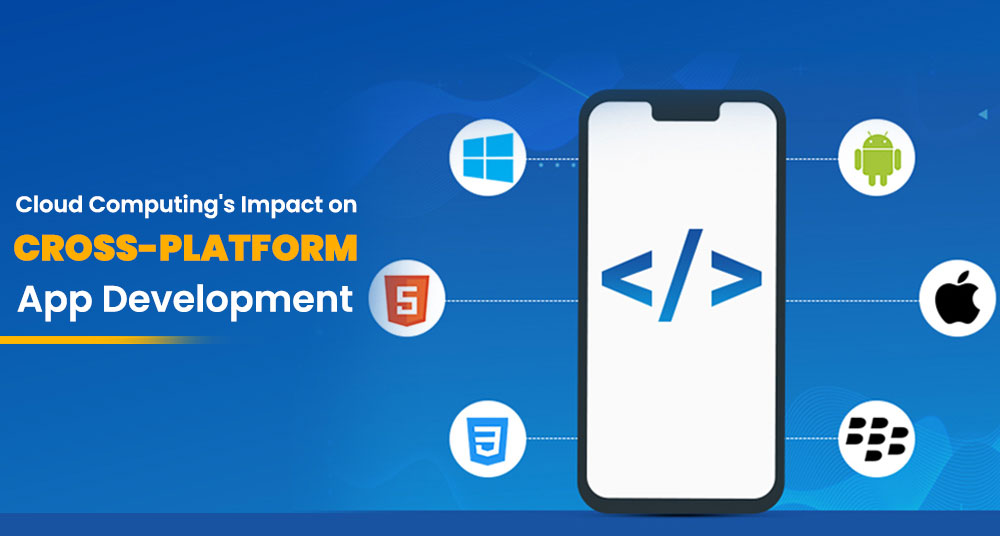For businesses, developing mobile apps is a torturous process. Building cross-platform mobile applications is a snap with the correct app development framework. There are, however, specific cautions to consider. While the correct app development framework may help speed the app development process, there are specific challenges to consider, which will be discussed further in this blog.
In today’s extremely dynamic and Darwinian mobile app development industry, businesses would not risk missing their presence on the Google Play Store or the Apple App Store. When it comes to native apps, budgeting is typically a concern.
Therefore, Android and iOS platforms are essential for businesses seeking a wider reach, and cross-platform app development has become the ultimate solution. This blog intends to alleviate pain points and assist entrepreneurs in comprehending the function of cloud computing in the cross platform app development process.
Before determining where this framework category lies in 2023, several fundamentals must be learned.
What is cross-platform app development?
With mobile applications becoming an increasingly vital element of the company, you must grasp the complexities of app development. Cross-platform mobile development involves the creation of software applications that can run on many mobile operating systems.
Developers of cross platform app development programs can share some or even all of the source code. This implies that developers can create and distribute mobile assets that operate on Android and iOS without capturing them separately for each platform.
Why is it significant and worthy in 2023?
Developing mobile apps that work across multiple platforms is a cost-effective solution that streamlines the development process using a unified codebase. It also aids in reaching a larger audience for your software. Cross-platform mobile app creation provides a consistent user experience across several platforms, making maintenance and upgrades easier.
What is cloud computing?
Cloud app development has come a long way since the days of bulky servers and cumbersome hardware when developers would spend hours upon hours making essential updates or waiting for code to compile. Thanks to the advancement of current technologies, you can now use many tools and platforms to make our duties much more bearable. One of them is cloud computing.
Cloud computing is a software-based infrastructure that delivers computing services such as data storage, security, processing power, and application hosting on remote servers accessed over the internet rather than personal hard drives or costly physical hardware. The big data centers that allow cloud services to be provided are looked after and hosted by a third party that owns the infrastructure. Access to data and apps from diverse locations is possible thanks to this. Users can adjust their computer power depending on their requirements and only pay for what they consume. Users can store and scrutinize their data if they have a stable internet connection.
Mobile app development is heavily influenced by the increasing popularity of cloud computing, which is predicted to exceed 200 zettabytes of stored data by 2025 and generate over $178 billion in revenue annually. This technology’s numerous advantages to businesses and individuals contribute to its success. How does cloud computing factor into the creation of mobile apps? Let’s take a closer look.
Expanding scalability can be achieved through cloud computing:
On-demand access to nearly limitless computing resources through cloud computing empowers you to scale your products in the most flexible way possible. This allows you to add and subtract resources and features without requiring infrastructure or hardware investments. Consequently, developers may adapt rapidly to any unexpected spikes in demand or changes in workloads caused by abrupt or planned surges in traffic or seasonal swings such as Christmas sales or special events, for example, without experiencing any crashes or downtime.
By eliminating the need for costly infrastructure implementations, cloud computing provides developers with unparalleled scalability, allowing them to expand the functionality of their mobile app without worrying about security or additional development costs. The approach is cost-effective, flexible, and efficient, freeing developers to focus on maximizing the potential of their app without having to set up expensive underlying infrastructure.
The use of cloud computing shortens development time:
Cloud computing developers may significantly reduce the time to market their mobile apps. For one thing, cloud computing enables developers to provide rapidly and de-provision innumerable computing resources on-demand. It allows them to obtain the required resources to accomplish otherwise time-consuming operations like testing without waiting for hardware implementations. Second, cloud computing platform providers frequently have all the core development tools required to accelerate development. Mobile application development can be a burdensome task. Still, developers can streamline the process with the aid of code repositories, IDEs, APIs, testing frameworks, pre-packaged functions, and various other tools. As a result, the time it takes to create high-quality mobile applications is significantly reduced.
Cloud computing allows Customization and faster time-to-market:
Developers may customize or alter the app using cross platform app development. Developers may modify the app once and distribute it across all platforms because the entire codebase is the same. This facilitates the creation of customized features or the adaptation of the app to different consumers or markets.
A company, for example, may develop cross-platform software that provides personalized experiences to its consumers. Developers may quickly add features or customize the app for different consumers or markets using a shared codebase. This assists organizations in increasing consumer engagement and satisfaction, which may result in higher revenue and brand loyalty.
Furthermore, cloud app development allows firms to react swiftly to market developments. Businesses can update their app more rapidly and keep ahead of the competition since updates can be applied to a single codebase. This is especially critical in fast-paced marketplaces where organizations must react swiftly to changing client wants and preferences.
Collaboration is made possible through cloud computing:
Resources and data are accessible remotely to developers with cloud computing, making it possible to work together on projects despite being in different locations, as long as an internet connection exists. This makes it simpler for team members to interact, collaborate, and complete collaborative activities, including sharing and reviewing code, assessing resources, and going through data points. This is critical for enabling speedier procedures and aiding in the overall efficiency of the app development process. Furthermore, cloud computing enables development teams to engage not only with one another remotely but also with freelancers, fostering speedy outsourcing and providing development enterprises and corporations with access to a worldwide talent pool.
Cloud computing aids in the reduction of development expenses:
Reduce costs whenever possible in app development to help businesses and developers deliver increased profitability, improve competitiveness, achieve a faster time to market, increase user engagement, and become more efficient at scaling quickly to adapt to changes, to name a few. In this regard, cloud computing has proven critical in assisting app developers in saving significant amounts of money!
By allowing developers to access computer resources through the internet, cloud computing may help them save money on expensive hardware, software, and infrastructure solutions commonly associated with traditional, on-premises development. Second, it can promote highly flexible and scalable development environments that allow developers to adapt their products to changing user needs, saving time and money by allowing them to focus on other more critical aspects of the development process, such as coding, rather than wasting time managing unwieldy hardware. Finally, the function of cloud computing in assisting developers in beginning small and expanding as needed is crucial for increasing cost savings and saving time and resources on unneeded implementations.
Cloud computing encourages cross-platform app interoperability:
The relevance of cloud computing in mobile app development involves more than just making development processes quicker and cheaper and allowing teams to work remotely. Combining cloud computing and mobile app development may also result in mobile apps that are cross-platform interoperable, which is critical to success in the current mobile app market.
Developing a mobile app with a cloud computing provider eliminates the need to create a separate application for each platform and device because cloud computing applications run through web browsers, allowing developers to create a single product that works effortlessly in all conditions, regardless of the platform or operating system they’re using, as long as there’s an internet connection. Furthermore, cloud computing eliminates the need for users to download and install numerous versions of the same program on their devices, which reduces the burden of resolving most compatibility issues. Consequently, developers can create mobile applications faster, and consumers can access and utilize them more easily.
Conclusion
Undoubtedly, cloud computing plays a critical role in cross-platform app development. It saves resources, time, and money for businesses that cannot or do not want to invest in their own hardware and physical infrastructure and provides a flexible and scalable paradigm for supplying computing resources on demand. In that regard, it has become an indispensable component of mobile app development practices worldwide, giving developers and organizations a slew of irrefutable benefits that allow them to create top-tier apps that can withstand the test of time. And as mobile app development evolves, it will undoubtedly continue to play an essential part in providing creative, robust, and user-friendly mobile apps.






What do you think?
It is nice to know your opinion. Leave a comment.